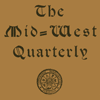
Mid-West Quarterly (1913–1918)
Date of this Version
1914
Document Type
Article
Abstract
When King David said in his haste that all men are liars, was he led to acknowledge the hastiness of his remark through reflection on its logical consequences? If he were, he showed commendable delicacy in taking for granted that we should see what the logicians insistently point out, that it must follow that he himself could not be believed. Reflection on this problem of verbal paradox has led some of the logicians, as well as the Psalmist, to wonder whether they have not made haste too rapidly. The paradox of the" Liar" is still with us; but modern writers, less hurried than David, usually state it in a form which leaves their own credibility beside the question and ponders only that of Epimenides the Cretan, our authority for the statement that all Cretans are liars. But with the most recent work in logic the comfort of so disinterested a position shows signs of forsaking us. Some of the solutions of this paradox begin to involve our right to make any statement about truth or logic and then claim that the statement itself is true or is logical. So Mr. Bertrand Russell would have us grant that no statement can contain any reference to itself, and that when we wish to assert, "All propositions have subject and predicate" or "Truth is relative," then our statements themselves cannot be propositions or be truth within the meaning of their subjects; nothing has been said, he asserts, about the statements in which our thought is couched.


Comments
Published in THE MID-WEST QUARTERLY Vol. 1, No. 3 (April 1914).